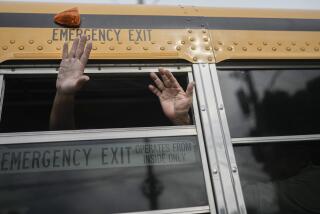Contras’ 1st Managua Visit Ends; More Talks Planned
- Share via
MANAGUA, Nicaragua — Contra leaders ended their first visit to Managua on Monday without progress toward a settlement of the Nicaraguan conflict. But they agreed to free all Sandinista war prisoners and return next week for further peace talks.
A joint communique issued after the three-day session said only that government and rebel leaders held “frank and direct conversations” about differing interpretations of the preliminary peace accord that they signed a month ago.
It said that they agreed to keep their separate negotiating teams in “permanent session” and to meet again here April 28-30.
Meanwhile, rebel leaders said they will release their last 45 to 50 Sandinista war prisoners, in response to an appeal by Nicaragua’s Roman Catholic bishops.
The return of the exiled Contra leaders to negotiate in Managua was a major concession by the Sandinista government. It grew from the March 23 accord signed in the southern border post of Sapoa, calling for a truce through May and follow-up talks on a final settlement of the six-year war.
Both sides said a climate of mutual confidence built during the Sapoa negotiations has since deteriorated. The Sandinistas say this is because Enrique Bermudez, the rebel commander in chief, who did not sign the Sapoa accord or come to Managua, wants to continue the war. The rebels say it is because the Sandinistas refuse to ease their one-party rule.
The talks here reached an impasse Sunday after the government announced a proposal for disarming the U.S.-backed rebels by July 1. This proposal said that until the rebels had committed themselves to a disarmament deadline, they could not take part in talks on political changes in Nicaragua, receive non-lethal U.S. aid for their troops or gain freedom for their prisoners.
Rebel leaders rejected the proposal and insisted on a two-step negotiating process: first to separate the two armies for a temporary cease-fire that would include prisoner exchanges and delivery of U.S. aid, then to seek political changes in return for disarming their troops.
Alfredo Cesar, one of four rebel directors at the talks, said Monday night that the government has dropped its proposal.
“The negotiating process is back on track,” he said. “Now we will go step by step.”
Gen. Humberto Ortega, the defense minister and chief Sandinista negotiator, did not confirm that the government had retreated from its position.
But Ortega stressed the importance of keeping the talks going in order to consign Bermudez and other hawkish elements of the rebel army to what he called “the garbage heap of history.”
Truce to Last Through May
Under the Sapoa accord, the two sides have until the end of May to reach a final agreement. Meantime, both said their informal truce will continue.
Because the rebel leaders still represent a belligerent force, their presence here was politically sensitive. All weekend, the government confined their 45-member delegation to the hotel where they ate, slept and negotiated.
Twice on Monday, rebel leaders were permitted to venture out--to visit Roman Catholic bishops and editors of the opposition newspaper La Prensa--and both times they were mobbed by small but enthusiastic crowds who shouted, “Long live the Nicaraguan Resistance!”
President Daniel Ortega, speaking to 20,000 Sandinista supporters summoned to a rally Monday night, explained that his government allowed the visit because it is strong and “not afraid of the Contras.”
FO(Southland Edition) Contra leader’s fans--Adolfo Calero is greeted by supporters at the offices of the opposition newspaper La Prensa in Managua. At right is Violetta Chamorro, publisher of the paper. Peace talks between the Contras and Nicaragua’s Sandinista government stalled Monday, but both sides agreed to meet again at the end of the month.
More to Read
Sign up for Essential California
The most important California stories and recommendations in your inbox every morning.
You may occasionally receive promotional content from the Los Angeles Times.













